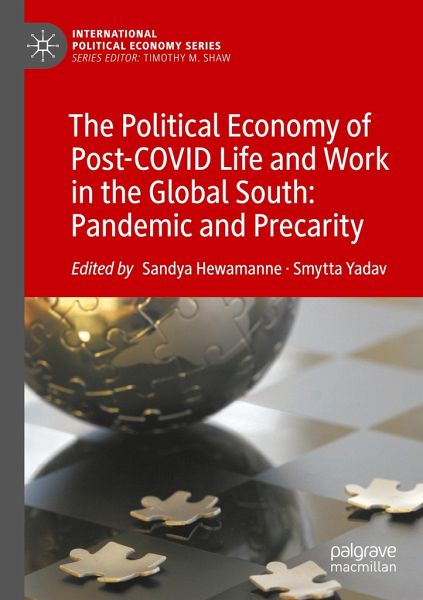
The Political Economy of Post-COVID Life and Work in the Global South: Pandemic and Precarity
Versandkostenfrei!
Versandfertig in 6-10 Tagen
65,99 €
inkl. MwSt.

PAYBACK Punkte
33 °P sammeln!
This edited volume highlights cascading effects of the pandemic and lockdown on informal economies of varied countries in the Global South. Uneven development after colonization, imperialism, and externally influenced conflict have caused many countries in the formally colonized or semi-occupied countries in the world to lag behind in wealth accumulation, investments in manufacturing, and technology. The fact that these countries were dragged into world market dynamics on an equal footing with already developed countries exacerbated these inequalities and saw the rapid burgeoning of informal e...
This edited volume highlights cascading effects of the pandemic and lockdown on informal economies of varied countries in the Global South. Uneven development after colonization, imperialism, and externally influenced conflict have caused many countries in the formally colonized or semi-occupied countries in the world to lag behind in wealth accumulation, investments in manufacturing, and technology. The fact that these countries were dragged into world market dynamics on an equal footing with already developed countries exacerbated these inequalities and saw the rapid burgeoning of informal economies. COVID-19 and the lockdown of western countries unravelled global production chains, resulting in hordes of workers in the Global South losing their livelihoods. Even people engaged in traditionally locally-bound economic activities, such as domestic work and sex work, found their livelihoods disappear. This volume brings together case studies from India, Brazil, Bangladesh, and Sri Lanka to analyze global economic disruptions as they affected informal sector workers who were already largely invisible within state development policies. The chapters question whether existing models of neoliberal development are still conducive within the post-pandemic Global South as it grapples with rebuilding economies, livelihoods, institutions, and systems of governance.














